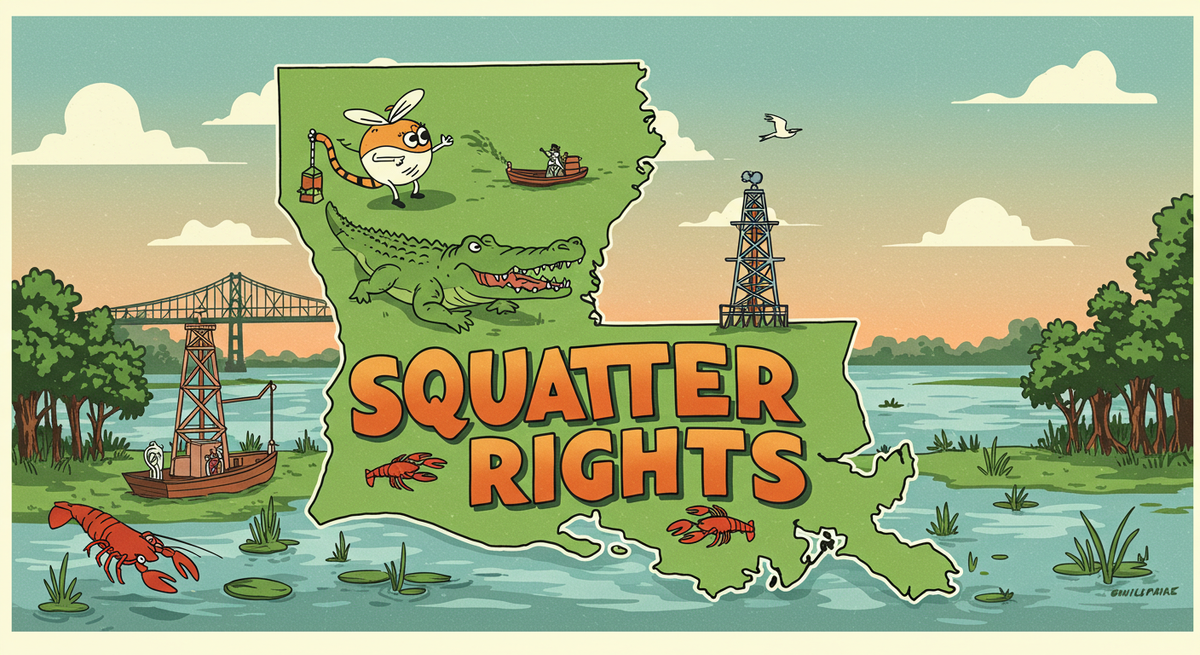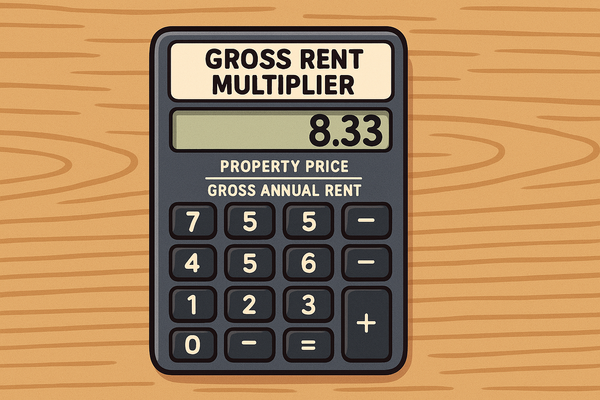Louisiana Squatter's Rights Guide: 2025 Laws, Senate Bill 466, and Protecting Your Property 🏠
Louisiana requires squatters to occupy property continuously for 30 years before they can file an adverse possession claim (reduced to 10 years with "color of title")

For property owners in Louisiana, understanding squatter's rights laws (officially called "acquisitive prescription") is crucial to protect your investment and prevent potential loss of property through adverse possession claims. Recent legislative changes have strengthened property owners' rights, but vigilance remains essential.
Key Takeaways
- Louisiana requires squatters to occupy property continuously for 30 years before they can file an adverse possession claim (reduced to 10 years with "color of title")
- Senate Bill 466 (effective August 1, 2024) now classifies squatting under the burglary statute, making it punishable by jail time
- Unlike requirements in some states, Louisiana does not mandate that squatters pay property taxes to establish an adverse possession claim
- Regular property inspections and security measures are the best prevention against squatters
- Louisiana's 30-year requirement provides significantly stronger protection for property owners than many other states
But First... A Squatter Snippet
The Audacious Squatter Who Listed a Family's Home for $225,000: In Baton Rouge, Louisiana, a brazen squatter named Joseph Guerin didn't just illegally occupy a family's inherited home—he renovated it without permission, transferred utilities to his name, and actually listed the property for sale online at $225,000, describing it as a "magnificent" property with a pool to "beat the heat." This extraordinary example of squatter audacity highlights why property owners must understand Louisiana's squatter laws and how recent legislative changes offer new protections.
Understanding Louisiana Squatter's Rights in 2025 and Beyond
In Louisiana, the legal landscape surrounding squatter's rights involves unique terminology and specific timeframes that property owners must understand. Unlike most states that use the term "adverse possession," Louisiana uses "acquisitive prescription" to describe the legal process by which squatters can potentially gain ownership of property. This distinction reflects Louisiana's unique civil law tradition, though the fundamental concept remains similar to common law states.
It's important to understand that squatting itself is not legal, though squatters have historically had certain rights through the doctrine of acquisitive prescription. This legal principle allows individuals who occupy abandoned or neglected property without permission to potentially gain legal ownership after meeting specific conditions over a designated period.
The distinction between squatting and trespassing is also critical. While trespassing is a criminal offense that involves entering property without permission, squatting typically involves a person living on a property for an extended period without authorization. The distinction becomes important in how law enforcement can respond to each situation.
Louisiana Adverse Possession Requirements
For a squatter to claim legal ownership through adverse possession in Louisiana, they must satisfy several stringent requirements known as the "OCEAN" framework:
Open
The occupation must be visible and obvious to anyone, including the rightful owner. This prevents hidden or secretive occupation from qualifying for adverse possession. The squatter must live openly as if they were the rightful owner.
Continuous
The squatter must occupy the property continuously for 30 years without interruption. Any temporary abandonment resets the clock on the adverse possession claim. This thirty-year timeframe is substantially longer than many other states require, providing significant protection for property owners.
Exclusive
The possession must be exclusive, meaning the squatter cannot share the property with others, including the rightful owner. The squatter must have sole control over the property.
Actual
The squatter must physically occupy the property and treat it as their own. This includes maintaining the property, making improvements, or otherwise demonstrating actual possession. Simply claiming the property without physical occupation is insufficient.
Hostile / Notorious
In legal terms, "hostile" does not imply aggression but rather indicates that the occupation is without the owner's permission and against their rights. This can include situations where the squatter honestly believes they have a right to the property due to a misunderstanding or error.
Beyond these five fundamental requirements, Louisiana law imposes additional conditions. The squatter must establish visible and discernible boundaries around the area they claim to possess, typically by building a fence or other enclosure that clearly delineates property lines.
Unlike requirements in some states, Louisiana does not mandate that squatters pay property taxes to establish an adverse possession claim. Nevertheless, having paid property taxes does strengthen a squatter's case if they pursue legal action.
Senate Bill 466: Louisiana's Game-Changing Squatter Law
On August 1, 2024, Senate Bill 466 took effect, representing a significant change to Louisiana's squatting laws. This legislation fundamentally transformed how unauthorized property occupation is addressed in the state, classifying squatting under the burglary statute and making it punishable by jail time.
Key Provisions of Senate Bill 466:
- Criminal Penalties: The law establishes squatting as a criminal offense rather than merely a civil matter, allowing for jail time for offenders.
- Expanded Definition: The bill specifically expands the definition of "remaining in or upon property" to encompass several situations relevant to squatting, including instances where an occupant remains on a property for more than five days after being served with a notice to vacate.
- Expedited Legal Process: The amendment allows for a temporary restraining order to be issued without notice when a plaintiff asserts they are being denied use of their property by someone without a legal interest in it.
- Law Enforcement Authority: Local law enforcement now has clearer authority to intervene in squatting situations, reducing the frequency of cases being classified as "civil matters" requiring lengthy court proceedings.
This legislation represents a decisive response to increasing concerns about squatting incidents throughout Louisiana, particularly in areas like New Orleans where, according to Louisiana Democrat Representative Alonzo Knox, there has been a "noticeable increase of complaints about squatters in many New Orleans neighborhoods."
How Louisiana's Approach Differs From Other States
Louisiana's approach to squatter's rights has evolved to become one of the most property-owner friendly in the nation, particularly after the passage of Senate Bill 466. Here's how Louisiana compares to other states:
Adverse Possession Timeframes
| State | Required Occupation Period | Tax Payment Required |
|---|---|---|
| Louisiana | 30 years (10 with color of title) | No |
| Florida | 7 years | Yes |
| California | 5 years | Yes |
| New York | 10 years | No |
| Texas | 10 years (3 with deed) | Yes |
| Georgia | 20 years (7 with deed) | Yes |
| Alabama | 10 years (color of title) | Yes |
Louisiana's 30-year requirement for adverse possession (10 years with color of title) is among the longest in the nation. This extended timeframe gives property owners substantial protection compared to states with much shorter requirements. For example, California requires only 5 years of occupation with payment of property taxes, while Florida requires just 7 years with color of title.
Enforcement Approaches
Unlike most states that still treat squatting primarily as a civil matter requiring court proceedings, Louisiana's SB 466 creates a direct pathway for law enforcement involvement (similar to both Alabama and the new Texas squatters rights laws). This represents a significant shift toward treating unauthorized occupation as a potential criminal matter rather than solely a property dispute.
States like California and New York still typically require property owners to go through lengthy eviction processes even for clear cases of squatting. In contrast, Louisiana now enables law enforcement to intervene more directly in many cases.
How to Prevent Squatters in Louisiana Properties
Prevention remains the most effective strategy for property owners. Here are key preventive measures to protect your property from squatters:
Physical Security Measures
- Install heavy-duty deadbolts and padlocks on all doors and entry points
- Consider upgrading to steel security screens and doors
- Install visible security cameras around the property
- Set up security alarm systems that alert you or local authorities to unauthorized entry
- Prominently post "No Trespassing" signs around the property
Regular Monitoring and Maintenance
- Conduct regular property inspections (every two weeks in high-risk areas)
- Maintain the appearance of an occupied and well-cared-for property
- Keep lawns mowed and remove trash and debris promptly
- Maintain exterior lighting to signal that the property is regularly monitored
- If the property will be vacant for an extended period, create the appearance of occupation through timed lighting and regular mail collection
Community and Professional Support
- Build relationships with neighbors surrounding your vacant properties
- Encourage neighbors to report any suspicious activity they observe
- Consider hiring a property management company for regular oversight
- Establish relationships with local law enforcement for increased patrols
Responding to Squatters: Step-by-Step Process for Landlords
Despite your best prevention efforts, you may still encounter squatters on your property. Understanding the proper legal procedures for removal is essential, as self-help measures like changing locks or shutting off utilities are illegal and can expose you to liability.
Initial Discovery and Assessment
Upon discovering squatters, first verify their status. Determine how long they've been occupying the property and whether they have any documentation they claim gives them rights to be there. Do not confront them aggressively or attempt to physically remove them, as this could lead to legal complications and potentially dangerous confrontations.
The case of Richard and Kristen Craven in Baton Rouge provides a cautionary example here. When they discovered squatter Joseph Guerin had occupied their inherited home, they wisely chose to monitor the situation from a distance rather than immediately confronting him. They observed an alarming pattern of activity with people coming and going from the property at all hours before taking legal action.
Formal Eviction Process
In Louisiana, you must follow the legal eviction process to remove squatters:
- Serve the appropriate notice to quit: a five-day notice for squatters who have been there less than a month, or a 30-day notice for those who have occupied the property for more than a month
- If the squatters do not vacate after the notice period expires, file an eviction complaint (called a "Rule for Possession" in Louisiana) with the appropriate court
- Attend the scheduled court hearing or have your attorney represent you, prepared to present clear evidence of your property ownership
- If the judge rules in your favor, the squatter will be given 24 hours to vacate the premises voluntarily
Final Removal and Repossession
Should the squatter fail to leave within 24 hours after the judgment, the court will issue a Warrant of Possession. This document authorizes the sheriff to forcibly remove the squatter from your property. Once the property is vacant, immediately secure it to prevent reentry by changing locks, repairing any damage, and implementing additional security measures.
Case Study: The Extraordinary Guerin Squatting Case
The case of Joseph Guerin's occupation of the Craven family's home in Baton Rouge represents one of the most audacious examples of squatting in Louisiana history and illustrates the challenges property owners can face.
Richard and Kristen Craven inherited a white brick home on Goodwood Boulevard after Kristen's parents passed away. The property remained vacant for only a couple of months while they prepared for renovations—a brief window that Guerin exploited to take possession.
What makes this case particularly remarkable is the extent of Guerin's entrenchment. He:
- Completely ransacked the home initially
- Placed a dumpster in the driveway and began unauthorized renovations
- Tore up carpeting, installed tile flooring, and added new countertops
- Painted virtually everything white—including a window to obstruct views
- Changed the locks and had utilities transferred to his name
- Listed the property for sale online for $225,000
When the Cravens initially contacted law enforcement, they encountered a frustrating legal complication. Responding officers initially classified the situation as a civil matter rather than criminal because Guerin had somehow obtained paperwork claiming he had paid property taxes on the home.
This legal limbo extended the Cravens' ordeal as they watched helplessly while their property was increasingly altered and damaged. Even after Guerin was arrested for unauthorized entry, he returned to the property after being released on bond and tried once again to sell it.
This case highlights why Louisiana has taken legislative steps to strengthen laws against squatters, recognizing the significant burden and damage they can cause to legitimate property owners.
Conclusion: Protecting Your Louisiana Property
Louisiana's approach to squatter's rights through acquisitive prescription provides property owners with significant protections compared to many other states. The extended 30-year occupation requirement creates a substantial barrier to successful adverse possession claims, giving property owners ample time to discover and address unauthorized occupation. Recent legislative changes further strengthen these protections by classifying squatting under the burglary statute and providing additional legal tools for property owners.
Nevertheless, the potential for adverse possession claims underscores the importance of proactive prevention strategies. Regular monitoring, robust physical security, proper maintenance, and community engagement can significantly reduce the risk of squatters gaining a foothold on your property. Should squatters appear despite these precautions, understanding and following the proper legal procedures for eviction is essential to quickly and lawfully regain possession of your property.
By combining preventative measures with knowledge of the legal framework, Louisiana property owners can effectively protect their investments from the risks posed by squatters and adverse possession claims. The state's unique civil law tradition and property-owner-friendly timeframes provide a strong foundation for these efforts, especially when property owners remain vigilant and responsive to potential threats.
Frequently Asked Questions
Q: What are squatter's rights in Louisiana? A: Squatter's rights in Louisiana (called "acquisitive prescription") potentially allow someone to claim ownership of property after occupying it openly, continuously, and without permission for 30 years (or 10 years with "color of title") while meeting specific legal requirements.
Q: Is squatting illegal in Louisiana? A: Yes. With the passage of Senate Bill 466, squatting is now classified under the burglary statute, making it a criminal offense punishable by jail time rather than merely a civil matter.
Q: How long does someone have to squat on property in Louisiana to claim ownership? A: In Louisiana, a squatter must continuously occupy a property for 30 years before they can file an adverse possession claim, or 10 years if they have "color of title" (a document that appears to give them ownership but contains a legal defect).
Q: Do squatters have to pay property taxes in Louisiana? A: Unlike some states, Louisiana does not require squatters to pay property taxes to establish an adverse possession claim, though doing so can strengthen their case.
Q: Can I physically remove squatters myself? A: No. Self-help evictions are illegal in Louisiana. Property owners must use legal processes to remove unauthorized occupants or risk legal liability.
Q: What if the squatter claims to have documentation allowing them to stay? A: This is a common tactic used by sophisticated squatters, as seen in the Guerin case. If confronted with this situation, document all paperwork they present, consult with an attorney immediately, and proceed with formal legal processes rather than self-help measures.
Sources and References
- WBRZ News: "Squatters invaded house, put it up for sale after owners died"
- Fox News: "Repeat squatter tries to sell victim's house second time"
- Newsweek: "New Orleans seeing noticeable rise in squatters, Louisiana Democrat"
- Louisiana Civil Code Article 3486-3488: Acquisitive Prescription
Legal Disclaimer
This article provides general information about Louisiana squatter's rights and is not intended as legal advice. Laws and their interpretation may change over time, and specific circumstances may affect how these laws apply to your situation. For guidance on your specific case, consult with a qualified real estate attorney licensed in Louisiana. The authors and publishers of this content are not responsible for any actions taken based on the information provided here.





